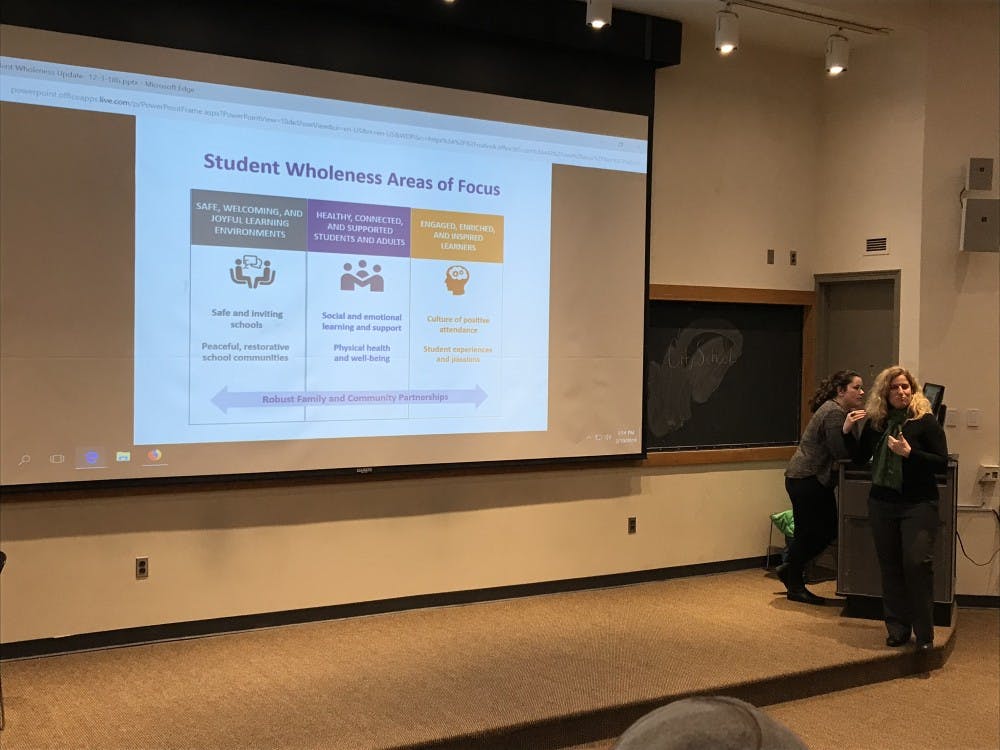Sarah Warren, the executive director of the Office of the Whole Child Services and Supports in Baltimore, gave a guest lecture during a class titled Health and Wellbeing in Baltimore: A Public Health Perspective. Warren discussed the importance of taking a holistic approach to improving student outcomes in Baltimore City Public Schools (BCPS).
Philip J. Leaf is the primary instructor of the class. Different speakers such as Warren come in each week to demonstrate different things being done in Baltimore to improve the health and well-being of residents. Guest speakers also shed light on the role that students can play in their community.
Warren explained that in a big urban school system, it can be easy for a student to feel lost. Whether or not the students feel connected to other people can have a direct impact on their mental well-being, social ties and long-term success, both academically and in life.
“A singular focus on academics is not enough. If we don’t nurture and support the whole student, all the aspects of who we are, our social and emotional selves, as well as our individual interests and passions, we’ll probably never get beyond where we are right now,” she said.
According to Warren, creating a safe, welcoming and joyful learning environment is the key to inspiring students to pursue their passions and reach their full potential. However, Warren explained that in many Baltimore schools, students do not get access to this type of environment.
“We lose a lot of students before they even get to the door. They don’t feel safe going to school because they have to pass by drug dealers on the way. They have to pass by blocks that are dangerous,” she said. “We have issues in our city that are not always directly related to the school but are affecting the student’s ability to engage successfully in school.”
Warren pointed to Baltimore school shootings that have negatively impacted students’ ability to do well in school. She explained that shootings can create an atmosphere where students, teachers and staff are uncomfortable coming to school and that this atmosphere can last for weeks.
Professor Leaf noted that poor building conditions and climate control systems are also a major environmental concern for many of the schools in Baltimore.
“You’ll have days when the schools have to close because it’s over 92 degrees in the building,” he said. “The ability to learn in a classroom has nothing to do with the competency of students or teachers if it’s impaired by the building being really hot or cold.”
Warren indicated that as a part of the initiative to tackle the problem, BCPS established intensive learning sites. These are sites where BCPS officials test different intervention methods to improve school environments. Depending on the successes of these methods, other schools can learn how to implement them from the intensive learning sites.
There are 55 learning sites in total. These sites aim to provide a safe and nurturing space for the students by designating a specific room with a trained staff member who can support them. This staff member helps the students de-escalate if they are agitated, build their social and emotional competencies, and manage their behavior in class so that they can become an active part of the learning community.
The intensive learning sites use school attendance as an indicator of how well they are supporting students and families.
“If students are not in school, we can’t teach them. But on the flip side of that, if students don’t enjoy school, they don’t want to come. So we have to have schools that are engaging, challenging and supportive enough that students want to actually come and be there,” she said.
In the future, she hopes that intensive learning sites can cause a noticeable shift in the academic outcome of the students and that other schools can start adopting their practices.
Junior Peyton Adair, who is taking the class, explained that she enjoyed the lecture because educational outreach is an area that she’s interested in studying.
“I’m particularly interested in education because I’ve been working in after-school programs for over three years. I would like to be involved in educational outreach,” she said.
Senior Michael Curry also agreed that the lecture was interesting. He noted the importance of learning about the problems with BCPS and how they are trying to improve them.
“I’ve been in Baltimore for four years, and it’s my first time taking a class strictly learning about how to make Baltimore a better place,” he said.





